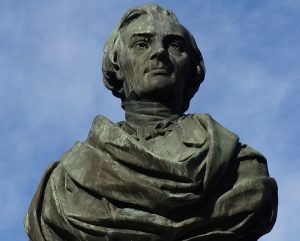The trade deficit has been in the news on both sides of the Atlantic in recent days. Shortly before winning the first round of the French presidential elections, Emmanuel Macron said, “Germany benefits from the imbalances within the eurozone and achieves very high trade surpluses. Those aren’t a good thing, either for Germany or for the economy of the eurozone. There should be a rebalancing.”
Just days later, President Donald Trump tweeted that U.S. GDP grew at a low rate, because “trade deficits hurt the economy very badly.”
Both men see international trade as a zero-sum game, where one nation’s prosperity comes at another’s expense. It may be well to remember that Germany’s trade surpluses finance the redistribution of wealth at the heart of the EU budget – more so than Monsieur Macron’s native country. And the U.S. trade deficit arguably generates foreign direct investment (FDI), causing the economy to grow, however haltingly. A sudden stop would trigger economic woes.
These two politicians, so different on issues such as immigration or EU membership, show that a wrongful emphasis on trade deficits stretches across the Atlantic.
What is a trade deficit?
The trade deficit is merely the amount of imports Americans purchase above and beyond what they export. The amount and persistence of trade deficits are not exactly “meaningless,” but they are not the unmitigated bad news that Messrs. Trump and Macron suggest, either.
At best, the trade deficit is a proxy for other economic measures that truly are important: productivity, per capita GDP, the value of currency, the amount and variety of consumer goods available for consumption, and – perhaps – the state of international relations between trade partners. Looking at these gives us a better economic diagnosis than the blunt tool of trade deficits.
For instance, a nation may run a high trade deficit due to falling productivity: It produces fewer goods and thus has less to export. Low productivity is perilous to the economy.
However, a nation may also have a high trade deficit because greater prosperity allows its citizens to purchase luxuries, including exotic goods from abroad. A more prosperous people might want a bottle of French champagne, a box of Belgian chocolates, or a bigger TV. Even King Solomon engaged in international trade to import foreign luxuries and to beautify the Temple in Jerusalem. Jaqueline Varas of the American Action Forum recently demonstrated that U.S. net imports run parallel with GDP growth. In that case, a net trade deficit is a sign of fiscal health.
This means that a trade surplus could result from Americans not having enough money to purchase the foreign consumer goods they want. The United States ran its smallest trade deficit in recent memory in 2009, when the economy was still reeling from the Great Recession. On the other hand, the boom years of 1984-1988 saw year after year of unprecedented trade deficits.
By itself, the trade deficit does not tell us that other nations are “getting the better” of us, that we are “too reliant” on foreign providers, or whether the economy is flourishing or failing. In fact, the nineteenth century French writer Frédéric Bastiat once recounted how he personally generated a minuscule trade deficit.
Enter Bastiat and Friedman

In his Selected Essays on Political Economy, Bastiat related how he exported a bottle of wine valued at 50 francs. He sold it in Liverpool for the equivalent of 70 francs and used the money to purchase British coal, which he imported back to France. In Bordeaux, it sold for 90 francs, earning him an 80 percent profit.
“These 40 francs – I have always believed, putting my trust in my books – I had gained,” he wrote. “But [a mercantilist politician] tells me that I have lost them, and that France has lost them in my person.”
More than a century later, Milton Friedman presented any trade deficit as a net positive:
The gain from foreign trade is what we import. What we export is the cost of getting those imports. And the proper objective for a nation as Adam Smith put it, is to arrange things, so we get as large a volume of imports as possible, for as small a volume of exports as possible.
This may be oversimplifying the matter – but not as much as their opponents
People of faith should care about this for two reasons. First, because the West’s prosperity depends upon understanding and implementing good policy based on sound economic principles.
Second, because the flourishing of the developing world depends upon access to the transatlantic market and other developed countries. Nearly one billion people have left the ranks of extreme poverty in the last 20 years, and two-thirds of the reduction is due to economic growth, including global trade.
“Peace and prosperity, in fact, are goods which belong to the whole human race,” wrote Pope John Paul II in Centesimus Annus. “It is not possible to enjoy them in a proper and lasting way if they are achieved and maintained at the cost of other peoples and nations, by … excluding them from sources of well-being.”
“The free market is the most efficient instrument for utilizing resources and effectively responding to needs,” he concluded.
Using the trade deficit as a crude measure of prosperity could cause the West to shut its doors to imports unnecessarily, harming all God’s children.
(Photo credit: By Thbz – Own work. This photo has been cropped. CC BY-SA 3.0.)

